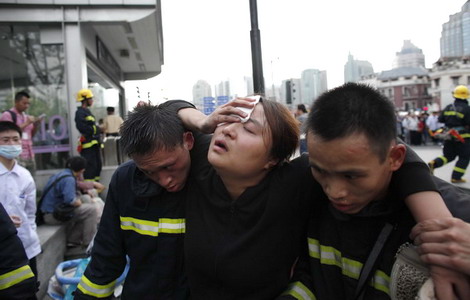Property owners warned over tax
Updated: 2011-09-28 07:33
By Zheng Jinran (China Daily)
|
|||||||||||
CHONGQING - City officials say owners of plush residential properties must pay their property taxes in October or face harsh punishments.
On Jan 28, Chongqing and Shanghai adopted the first property tax ever imposed in China, placing it on expensive residential properties in the hope of curbing soaring prices and real estate speculation.
In Chongqing, the tax applies to existing residential properties, while in Shanghai it only falls on properties that were purchased after its adoption date.
According to statistics, more than 3,400 taxable properties existed in Chongqing's nine major districts before Jan 28.
In charging the tax, the municipality uses rates that vary with the sales prices of new and existing houses. The lowest price at which taxes are charged is 9,941 yuan ($1,554) a square meter.
Houses that sell for that much will be taxed at a rate of 0.5 percent, while those that are more expensive can be subject to rates as high as 1.2 percent. People who don't own hukou (residency permits) nor have jobs or a company in Chongqing will also be taxed at a rate of 0.5 percent when they prepare to buy a second apartment.
And those who fail to pay their yearly taxes during the October taxation period will be subject to fines, restrictions on their ability to go abroad or exposure in the media.
"The revenue that comes to local governments is mainly from selling land, but the supply of land is not unlimited," said Liu Yuan, an analyst with China Centaline Property Research in Shanghai. "So they need a consistent and stable revenue source, such as property taxes."
"Besides, the government needs the tax, as well as other measures, to curb speculation."
Some see justice in imposing the tax on those who can most afford to pay it.
"Levying taxes on both newly built and existing houses, to some degree, can help reduce the inequalities that exist between the rich and the poor," said Yin Boping, head of Real Estate Research Center of Fudan University. "It's a step ahead of Shanghai."
By imposing the tax, local governments are likely to pay more attention to providing public works and services rather concentrating solely on selling land at high prices, said Chen Jie, another professor from Fudan University. Both Yin and Chen agreed that Shanghai is not likely to place a tax on existing properties in the near future.
"The number of taxable houses will be much larger," Yin said. "And if we did, it will hit the real estate market, decreasing housing prices and land prices. We would then bring in less revenue, too."
He said the effects of the new tax will be small, both because it is levied at a low rate and because it only applies to a small part of the housing market.
"What's more, the two cities haven't seen a large decrease in housing prices or other great changes since they implemented it in late January," Yin said.
Ma Wei and Wang Ying contributed to this story.
China Daily
(China Daily 09/28/2011 page4)
- 271 injured in Shanghai's subway crash

- Sino-DPRK trade zone 'going well'
- Probe to look into fatal train attack
- Asian powers start key dialogue
- Spacecraft ready to go on mission
- Guard kills US citizen at CIA base
- Shanghai subway trains rear-end, 270 injured

- Last-minute preparations for spacecraft launch
Hot Topics
Libya conflict, Gaddafi, Oil spill, Palace Museum scandal, Inflation, Japan's new PM, Trapped miners, Mooncake tax, Weekly photos, Hurricane Irene
Editor's Picks

|

|

|

|

|

|







